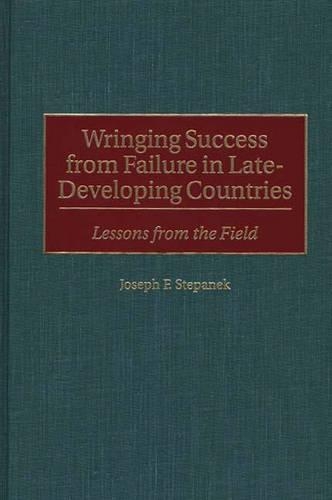
Wringing Success from Failure in Late-Developing Countries: Lessons From the Field
(Hardback)
Publishing Details
Wringing Success from Failure in Late-Developing Countries: Lessons From the Field
By (Author) Joseph F. Stepanek
Bloomsbury Publishing PLC
Praeger Publishers Inc
30th September 1999
United States
Classifications
Tertiary Education
Non Fiction
Development economics and emerging economies
338.9091724
Physical Properties
Hardback
264
Description
Development has alleviated poverty in many countries during the 50 years since the end of War World II, yet half of mankind remains poor; a fifth are very poor. Poverty is not a state of nature, but, as Stepanek shows, can be ascribed to manmade institutions that reflect self-serving and self-indulgent ideologies, poorly tested theories and policies, weak governments, and poverty alleviation programs that are questionably designed and poorly administered. Dr. Stepanek asserts that poverty cannot be alleviated without challenging all of its root causes, and he shows that well-designed development strategies and foreign assistance programs can create growth and reduce poverty. Western governments, international banks, and donor agencies must reexamine how they design and administer foreign aid if they are to be successful. Stepanek explains foreign aid in general and in specific, in history and theory, and in its present and practical forms.
Reviews
.,."development practitioners, members of the academic community, and others interested in development and development-assistance issues should all find this book highly rewarding, even when they disagree with some conclusions and recommendations. As a praticipant in the development process who combines intimate knowledge with anyaltical reflection, Stepanek gives us valuable insights not readily discernible by those outside the loop."-Journal of Developing Areas
.,."this a brilliant and self-critical work....it is a must read for all stakeholders in the development of late-developing countries, all true Africans (at home and in the diaspora) who yearn for and are working towards a better sub-Saharan Africa."-African Studies Quarterly
...development practitioners, members of the academic community, and others interested in development and development-assistance issues should all find this book highly rewarding, even when they disagree with some conclusions and recommendations. As a praticipant in the development process who combines intimate knowledge with anyaltical reflection, Stepanek gives us valuable insights not readily discernible by those outside the loop.-Journal of Developing Areas
...this a brilliant and self-critical work....it is a must read for all stakeholders in the development of late-developing countries, all true Africans (at home and in the diaspora) who yearn for and are working towards a better sub-Saharan Africa.-African Studies Quarterly
..."this a brilliant and self-critical work....it is a must read for all stakeholders in the development of late-developing countries, all true Africans (at home and in the diaspora) who yearn for and are working towards a better sub-Saharan Africa."-African Studies Quarterly
..."development practitioners, members of the academic community, and others interested in development and development-assistance issues should all find this book highly rewarding, even when they disagree with some conclusions and recommendations. As a praticipant in the development process who combines intimate knowledge with anyaltical reflection, Stepanek gives us valuable insights not readily discernible by those outside the loop."-Journal of Developing Areas
Author Bio
JOSEPH F. STEPANEK currently is Visiting Fellow at The International Food Policy Research Institute. Dr. Stepanek's career with the United States Agency for International Development took him to Indonesia and Kenya, and then to Tanzania, and Zambia, where he served as AID Director. His earlier food and agricultural policy study6 was Bangladesh-Equitable Growth (1979).
